In this very special episode of The Happy Doc, Taylor…
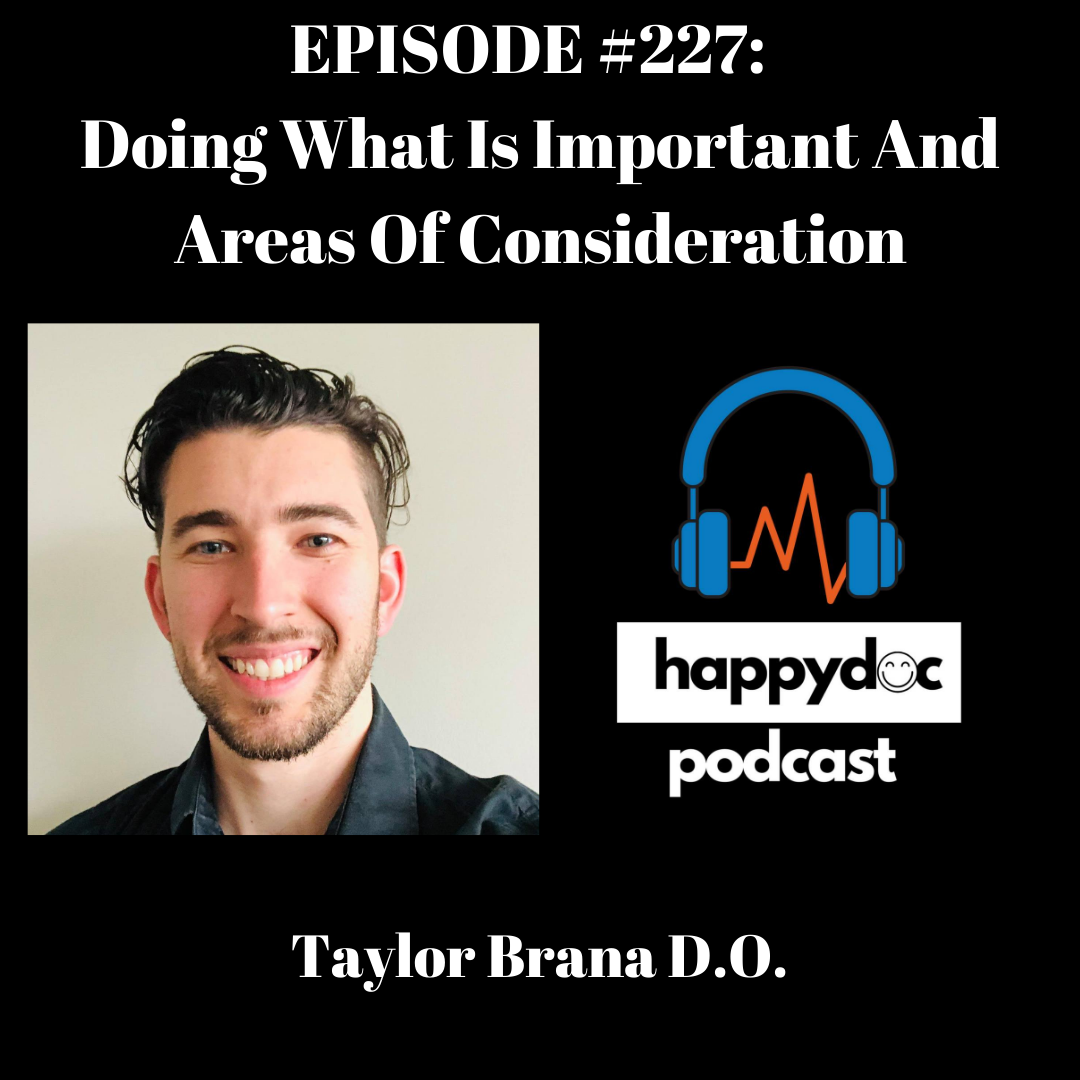
Doing What Is Important And Areas Of Consideration
[podcast src=”https://html5-player.libsyn.com/embed/episode/id/14515892/height/90/theme/custom/autoplay/no/autonext/no/thumbnail/yes/preload/no/no_addthis/no/direction/forward/render-playlist/no/custom-color/88AA3C/” height=”90″ width=”450″]
In episode #227 Taylor Brana DO discusses being more effective by doing things that are important and areas of consideration.
Get It Out Of The Way
Being more effective means having more time for the things we care about. Every person has different sets of preferences, but we certainly all have things we would prefer not to do, but must. To be more effective with our time, it is important to be able to get what we must do out of the way, so we can spend more of our time enjoying life.
Will power is the ability for one to overcome urges or resistances as they come up. We utilize will power in areas where we know the long-term positive impact is worth the initial negative pain of the situation. Each individual has different times where their willpower is at it’s highest. For most, this level of conscious control over ourselves happens in the morning.
To get the most out of your day, get tasks that are important, urgent, and of the highest resistance (or frustration) completed first. This is my personal favorite strategy. By removing the frustrating part of the day out of the way, the rest of the day is experienced with more lightness, knowing that the perceived difficult portions of the day are completed.
The Snowball Method
The snowball method works a little bit differently when it comes to tackling tasks. This method, as the name suggests, is about building momentum to tackle things that are perceived to be larger or more difficult. We all have things that look like mountains to climb, but if we can first walk up a small hill, and then a slightly higher hill, so on and so forth, we will eventually hit the summit. By understanding that it feels good to complete tasks that are easier first, we can build our emotional and motivational self-esteem to complete the tasks that are difficult.
A caveat to this method is that it is also a great avoidance strategy. Many of us go through life completing lesser important tasks to make us feel good, without regard to actually taking care of what’s important. This strategy is great for momentum, but do not mistake that with being truly effective. Being effective means getting things done that are important efficiently. In order to make true breakthroughs, we must determine what is actually important first.
What Is Important
Identifying what tasks are truly important is an interesting question. What makes something important? In the book The One Thing by Gary Keller (a successful entrepreneur, book author, and speaker) he brings up a question which I will paraphrase: what is one thing I can do today, that by completing it, will make other tasks or future tasks easier or obsolete?
What is important today, is different than what is important long-term. We may consider certain tasks we are completing “important” but when we really reflect on the tasks we are completing, we are simply repeating the same tasks over and over again. We must take into account tasks that will improve our life situation and enhance the quality of our time. If you look at tasks from this angle you may consider the following categories:
- Tasks I am behind on completing (past/debt/urgent)
- Tasks I need to get done for today (maintenance/present/more urgent)
- Tasks I can get done which will make life easier or improve the quality of my life (important, but perceived as less urgent)
- Tasks I can complete which will make tasks in category #1 and #2 obsolete and increase time in category #3 (perceived as least urgent and least important, or unaware).
Breaking down the categories
Most individuals are so worried about tasks in category #1 or #2 that they spend very little time in category #3. By recognizing, developing, and completing at least one task in category #3, you can begin to carve out important habits that will improve the quality of your life. Category #4 is a special case of a task that is about improving the system you are operating by and that allows you to begin to eliminate tasks in #1 and #2 altogether. By reducing tasks in #1 and #2 we can tackle category #3 which is about completing important high-value things.
**As time is optimized in categories #1 and #2 and more time is spent in #3 and #4, more altruistic activities become accessible**
Upgrading The Operating System
Every person on this planet runs their day in a certain way taking into account their values, skills, personality, and habits. Some people have a system, and others have a no-system system. Regardless of how organized each individual is, without reflection of the habits, routines, and actions, results will be the same. By reflecting and changing the system that a person uses, they can create the results that make a difference. An example is trying to run a Windows 95 computer versus running windows 10 on the latest PC. Many more functions can be completed with increased efficiency and speed on the latest computer and operating system. Two individuals with the same inputs will have outputs that are completed with different quality and efficiency due to working on different operating systems.
As mentioned above, what I have labeled category #4 is working on the operating system by which we complete and perform tasks. I will list different areas below to consider that can improve and enhance the experience. Below is not an exhaustive list but provides ideas to work on that may be implemented at any time. I will list ideas with a short explanation, but not a thorough examination of implementing each concept.
Ideas To Improve The “Operating System”
Brainstorming: Brainstorming is important to put many ideas out, no matter how outrageous, and creating potential concepts or ideas to implement. Often we don’t realize the importance of creating many ideas and thinking through many options afterward. Brainstorming is often arbitrarily performed and once things “feel right” we then proceed to choose an idea and perform tasks. Depending on the importance/size of the project, it can be helpful to consult multiple field experts in an idea to generate an effective set of possibilities before acting.
Prioritization: As discussed at the beginning of the article, not all tasks are created equal. Some tasks are more important or provide more value than others. Prioritization is the ability to parse through a list of tasks and choose the ones which are most valuable. Practicing prioritization (keeping in mind the categories above) increases the importance of the tasks that are accomplished but does not increase the number of tasks that are completed.
Blocking Time: Blocking out time to complete certain tasks and keeping to that schedule is important. Most individuals complete things in a round-about way without conscious control of their time (myself included). By blocking out specific times to be productive, one enhances the efficiency of completing tasks.
Reducing Distractions: Reducing distractions pairs well with blocking as discussed above. By reducing all distractions and creating an environment with only the necessary resources for the task, one can begin to have full immersion and focus on the work they are doing. Consider the environmental components that will impact task completion. Simple things such as having a clean workspace and turning off, silencing, reducing notifications on the cell phone go a long way.
Full Immersion: Full immersion implies that you are completely into the work you are doing. Focus is placed on the task at hand and is not placed on other issues or concerns. The task is the current objective and when tasks are handled in this way it is completed with greater depth, speed, and accuracy. More tasks can be completed with higher levels of efficiency and clarity by becoming fully immersed in the task at hand.
Serial Tasks: Some tasks may be completed in serial based on the specific nature of the task. For example if exercising and dry-cleaning are on the list and the gym is right next to the laundromat, you have saved yourself some time. Be cognizant of tasks that can be performed with more efficiency when brought together.
Parallel Tasks (Cooking In The Oven): When making food, some food requires more direct supervision, and other dishes can be baked in the oven. Completing tasks can be thought of in this way. When we bake things in the oven, it requires initial preparation and placement in the oven, and then a timer is set. Multiple tasks can be completed in parallel where multiple tasks are “cooking” while other tasks require direct supervision.
Automation: In the digital age there is an application for most things in life, and if there isn’t it will likely be made eventually. Not all tasks need to be completed by you. Many tasks can be completed by a tool that can take the unnecessary tedious areas of work out of the equation. Consider areas of repetitive work that may be completed by software.
Delegation: Not all tasks need to be completed by you, it can be completed by someone else. Each individual needs to understand their innate skills and level of expertise so that they can maximize their talents, and not waste time on tasks that reduce their own value. By recognizing areas where you can begin to step away, you can step away and offer someone else a learning experience that also frees up your time. It is important to reflect often and see if your time is being focused on what is important.
Elimination: Some tasks do not need to be finished. Many individuals live their lives taking on additional obligations or promises (saying yes) without having the confidence to say no, or consider what they can actually handle. Eliminating tasks before entering a responsibility is important to review and consider. This will free up time for what is important.
Measuring The Process: You can measure success by the results. Paying attention to what is working and what is not working by reviewing results is important. What outcomes are you going to use as your measuring stick? One area to consider is fulfillment: how do you feel in the completion of what you do? What steps of your process make you fulfilled? What areas of the process drain you?
Measuring Meaningful Results: Measuring meaningful outcomes or results depend on the task/project that is being completed. When we measure a result, we need to measure something that is meaningful to the task at hand. We are more likely to be aware of our actual performance and not just how the performance feels when we select meaningful results to measure.
Purpose: A strong purpose provides the fuel and motivation needed to get organized. If we cannot find meaning in our work to enhance production, then what we produce doesn’t matter. Underlying all efficiency requires a deep why. Maybe it’s for family, maybe it’s for working through a difficult or hard past, but whatever the reason, purpose is the rocket fuel. The stronger the purpose the easier it is to stay motivated.
Gratitude: gratitude does not necessarily increase efficiency but it enhances the feeling and the way that work is being completed. If you go to work or do your job constantly looking at the time and waiting for it to be finished, you are likely not appreciating the context that has brought you to this moment today. Gratitude allows us to notice and appreciate the good things happening now and to focus less on our shortcomings, setbacks, and difficulties.
Value: Consider how tasks you are completing provide value to yourself, your loved ones, or those you work with. Value is the ability to provide something useful to someone else. When we provide value, we elevate the potential and ability of someone else through what we provide. Learning to receive value and give value is what providing service is all about. When it comes to considering the importance of tasks consider how the task allows you to receive value or provide value.
Consistency: Consistent work of any practice over time usually increases the rate the performed task is completed.
Technique/Coaching: Consistent practice increases the speed of performing a task. Working on the technique of a skill/practice improves the efficiency and the way in which a task is performed. Most individuals are consistent in their work but may not consider coaching of their technique to make sure how they are performing provides the highest value and skill. Considering reading books, watching videos, reading articles, or having a formalized coach can improve the technique you perform skills and actions in life.
Reflection: practices such as tracking results, journaling, therapy, meditation, etc., provide the opportunity to reflect on what we are going through. Reflection around a task allows us to look at the different aspects of what we performed and how we performed it. When we reflect more often we are able to squeeze the pearls of wisdom from the experience. An experience without a review and reflection loses the maximal potential for growth. Creating time or a system to reflect, increases the opportunity for us to operate at our best.
Taylor Brana is a Physician and currently in his Psychiatry Residency. He hosts The Happy Doc Podcast and is co-founder of multiple audio educational platforms including MedFlashGo the first voice-based interactive medical question bank. He has a passion for education and inspiring individuals to be their best selves.
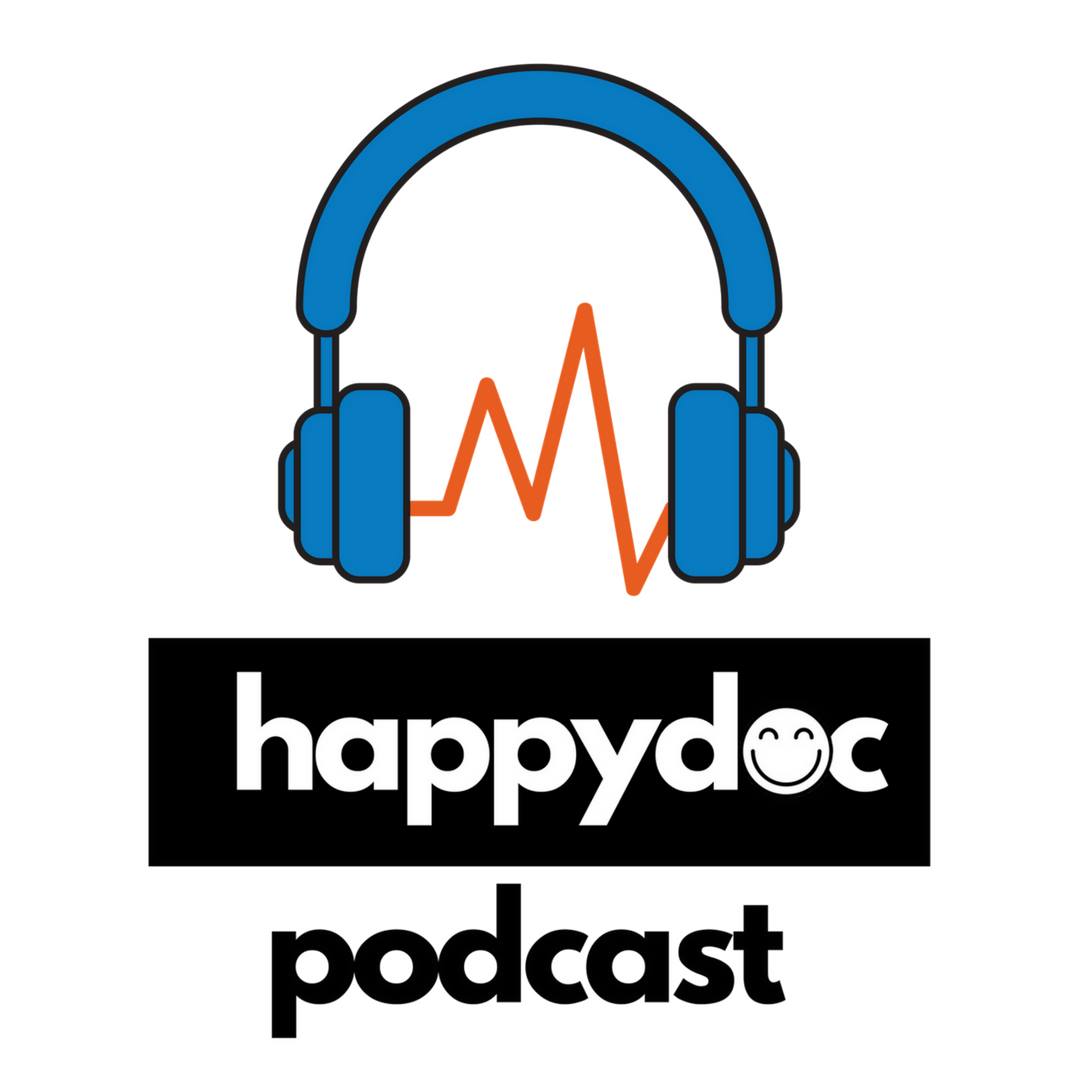
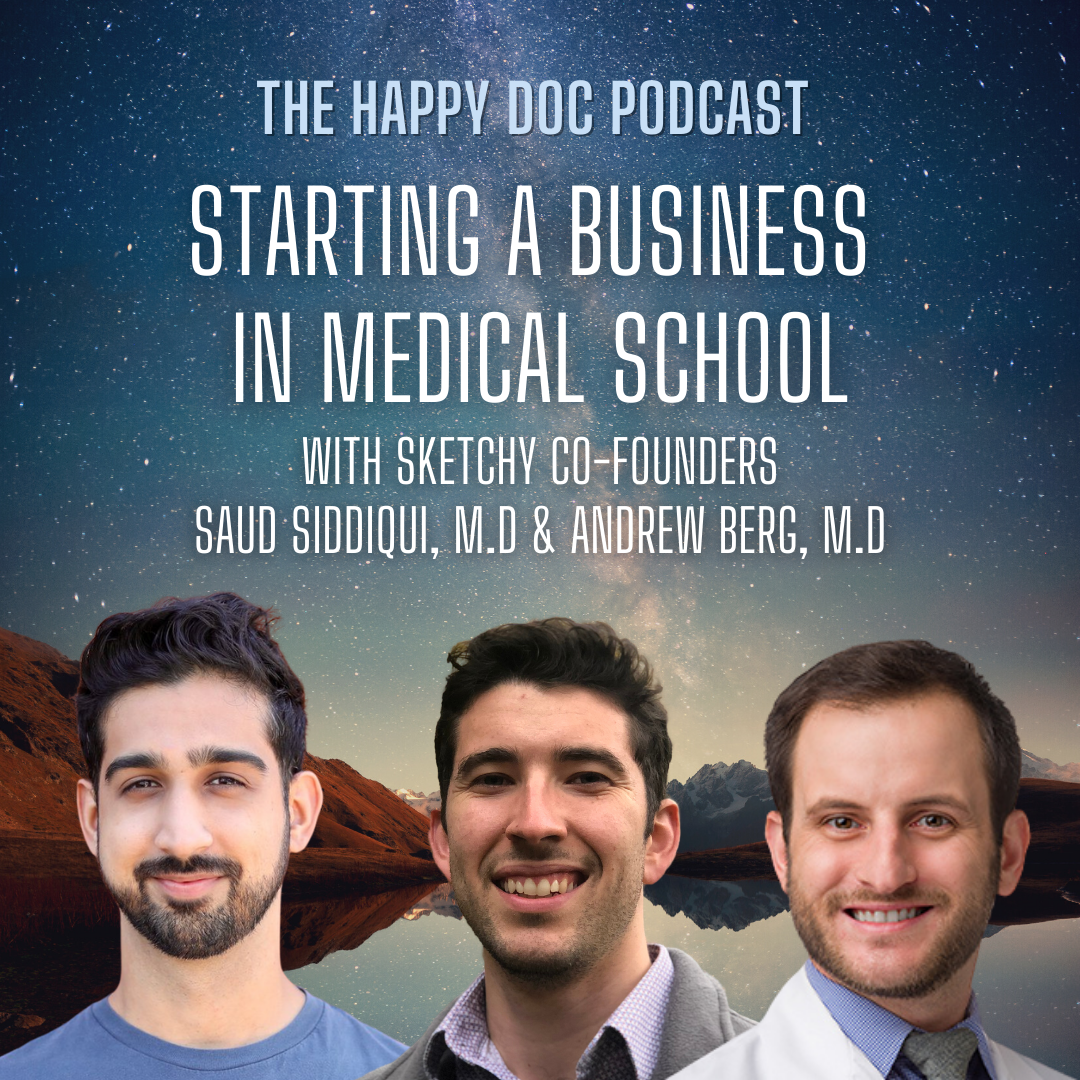
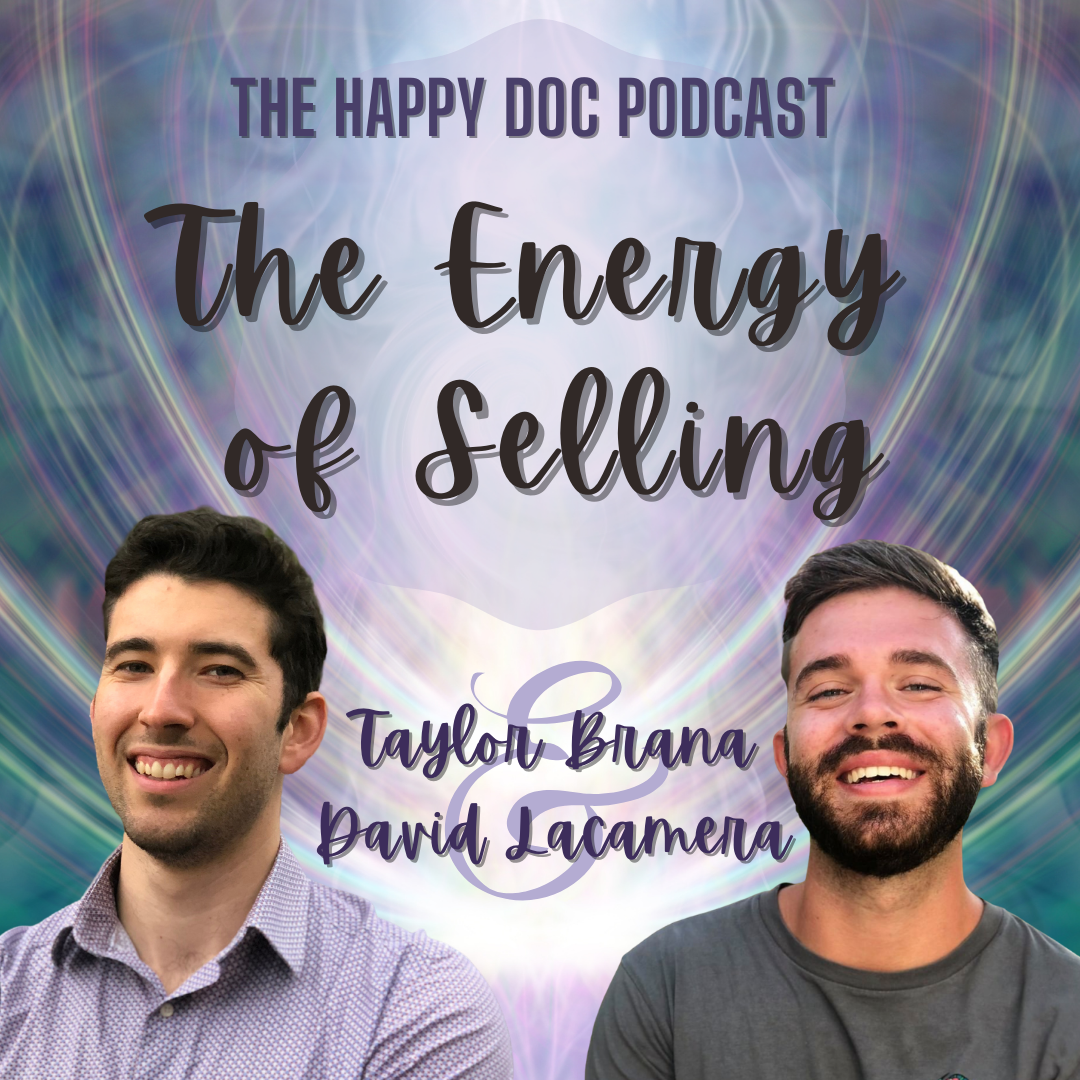
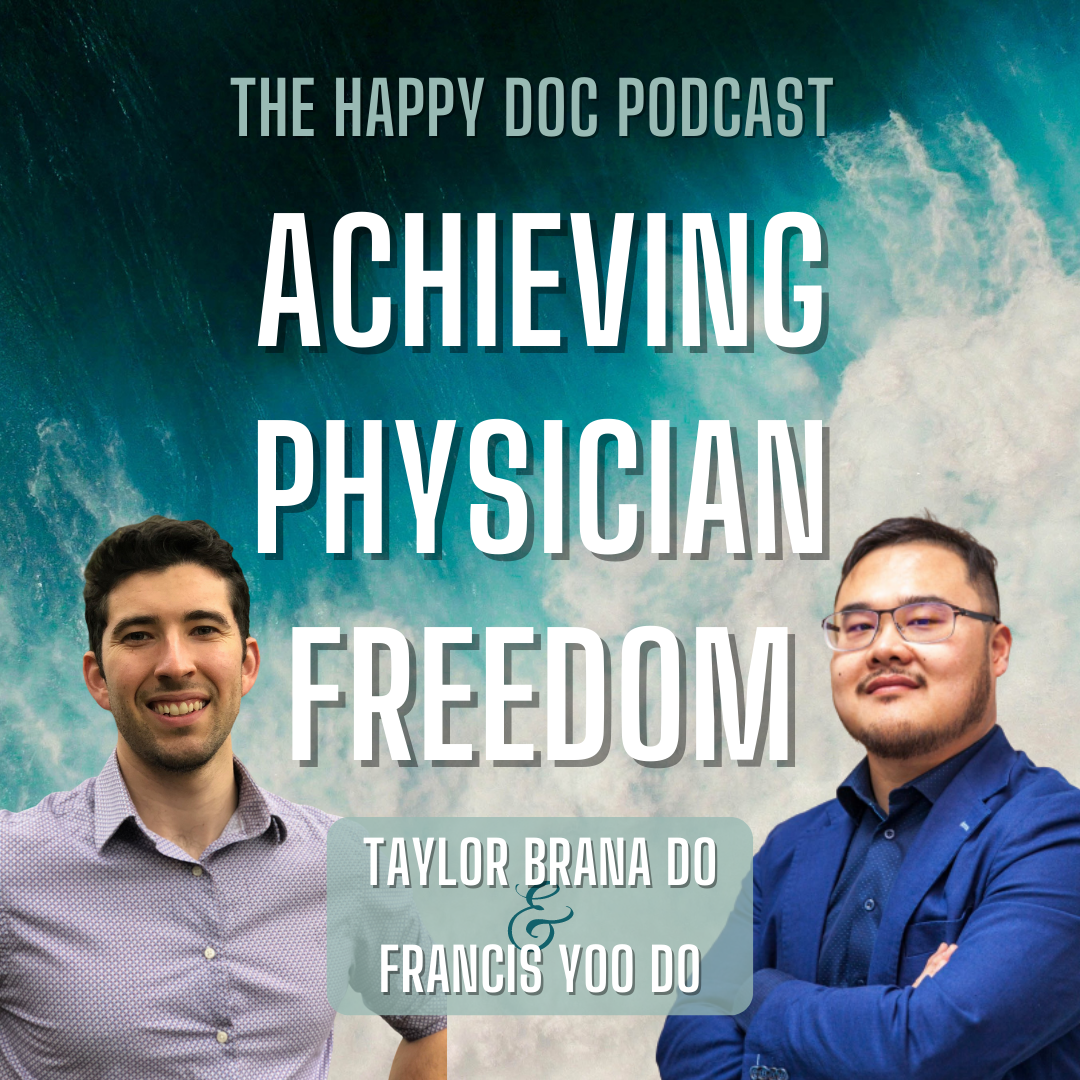
This Post Has 0 Comments